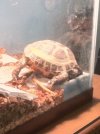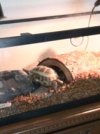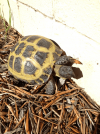- Joined
- May 2, 2012
- Messages
- 77
Hello, I'm new to forum. I have a 3-4 year old Russian named Henry that we've owned for just over a year.
In this past year, his level of activity changed a lot. He seems to have "upswings" and "downswings" every few weeks or months. For a while, he will be quite active and eat all his food and spend most of his time basking in his lamp and exploring his enclosure. Then, for a few weeks or months he will mostly hide under his log and eat almost nothing.
This doesn't seem to be hibernation or estuvation, as it happens so frequently. We live in Virginia, and there are often not drastic weather changes related to his behavior. Is this behavior typical for Russians?
I've attached a couple photos of Henry here. I really appreciate any feedback!
In this past year, his level of activity changed a lot. He seems to have "upswings" and "downswings" every few weeks or months. For a while, he will be quite active and eat all his food and spend most of his time basking in his lamp and exploring his enclosure. Then, for a few weeks or months he will mostly hide under his log and eat almost nothing.
This doesn't seem to be hibernation or estuvation, as it happens so frequently. We live in Virginia, and there are often not drastic weather changes related to his behavior. Is this behavior typical for Russians?
I've attached a couple photos of Henry here. I really appreciate any feedback!



